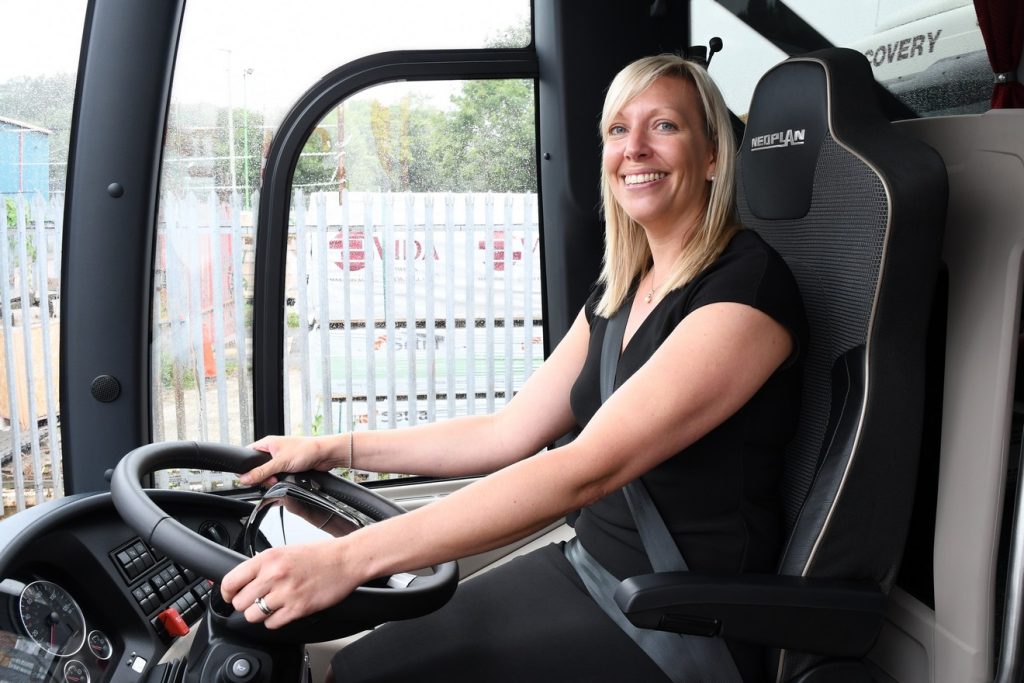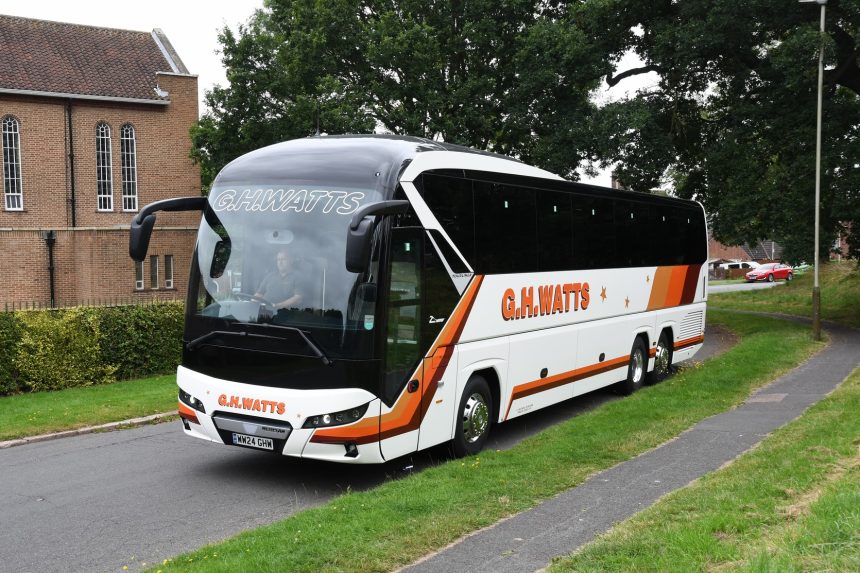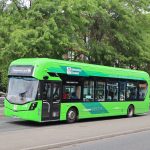Having celebrated its 60th anniversary in 2023, Leicester-based G.H.Watts Coaches has a thriving business focused on private hire and school contracts. But how is the family-owned company facing today’s challenges?
It’s 1959 and George Henry Watts and his friend Charles (Dick) Keeber are operating a taxi in Leicester. John Keeber, Dick’s son, and an engineer by trade, is helping them out with the odd taxi job. Taking on staff transport for a local factory sees George and Dick progressing from cars to a minibus and eventually a coach. John begins to take on a more active role with the business, now named Park’s Taxis and Coaches.
Embracing the benefits of working together as well as George’s name in the local community, the business is renamed G.H.Watts Coaches. John marries Margaret, George’s daughter, and the rest, as they say is history.
Fast forward to 2015 and John steps back, handing over the day-to-day operation of the business to his sons Richard and David, although continuing to do bits and pieces. Today, it’s Richard and David who lead the business, Richard focusing on the commercial side with David running the workshop. Laura, Richard’s wife, adds to the family involvement, looking after compliance and operations. She also drives and holds her Transport Manager CPC. Completing the small office team is Emma Allen who looks after the accounts and office administration.
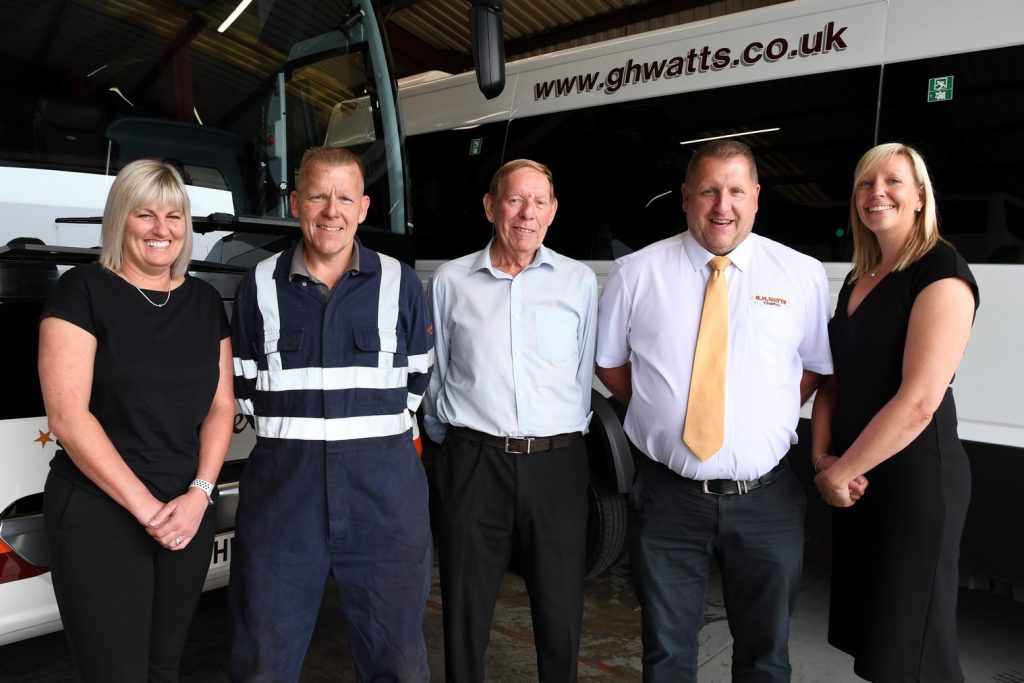
In a better place
I’ve travelled to the purpose-built site on the western side of Leicester that has been the company’s operating base since 1995 to meet Richard and to find out more about the challenges facing the business. Joining us is John, now 82, and it’s not long before the conversation turns to how things have changed over the years.
“We’ve always faced challenges,” says John. “I remember when we had to move from vehicle certification in the early 1980s to having to put each vehicle through an annual MOT. At the time I remember that being a real pain, but this industry has always embraced change. We simply get on with things. I feel we’re in a better place now, both business and engineering-wise, than it was in my early career. The need for compliance across everything we do, whilst the processes can sometimes seem unwieldy, has undoubtedly been beneficial.”
Richard explains the make-up of work.
“We’re what I would describe as a low-mileage operator,” he says. “Our work focuses on our local community, schools and colleges. We’ve consciously always kept away from operating service work, as well as public day trips and tours. We’re in part of the country where competition for drivers is intense. Our rates are up but compared to bus driving they aren’t attractive enough. Our standards are high but we find that our drivers do like working for us with some travelling each day from outside the county. However, the industry-wide driver shortage has meant we’re seriously considering whether we have to reduce the fleet.”
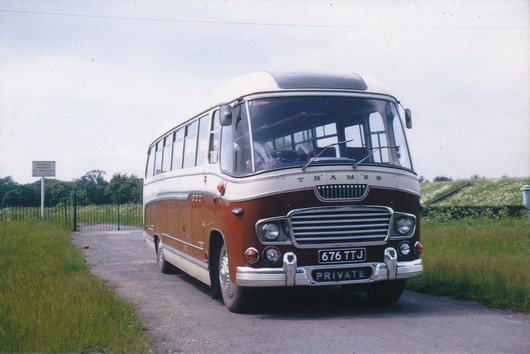
Contingency costs
Private hires for schools and colleges often see coaches heading to the continent.
“We do a run to Tropolach in Austria, near the Italian border, a run that we’ve been doing for 28 years,” says Richard. “We prefer the ferry over the tunnel because it gives time for the necessary breaks. Driver comfort is paramount on long-haul, double-staffed journeys through the night, so our tour coaches are all provided with a purpose-designed driver’s bunk. That takes up space so where needed we have a ski-box fixed to the rear of the coach providing additional luggage capacity.
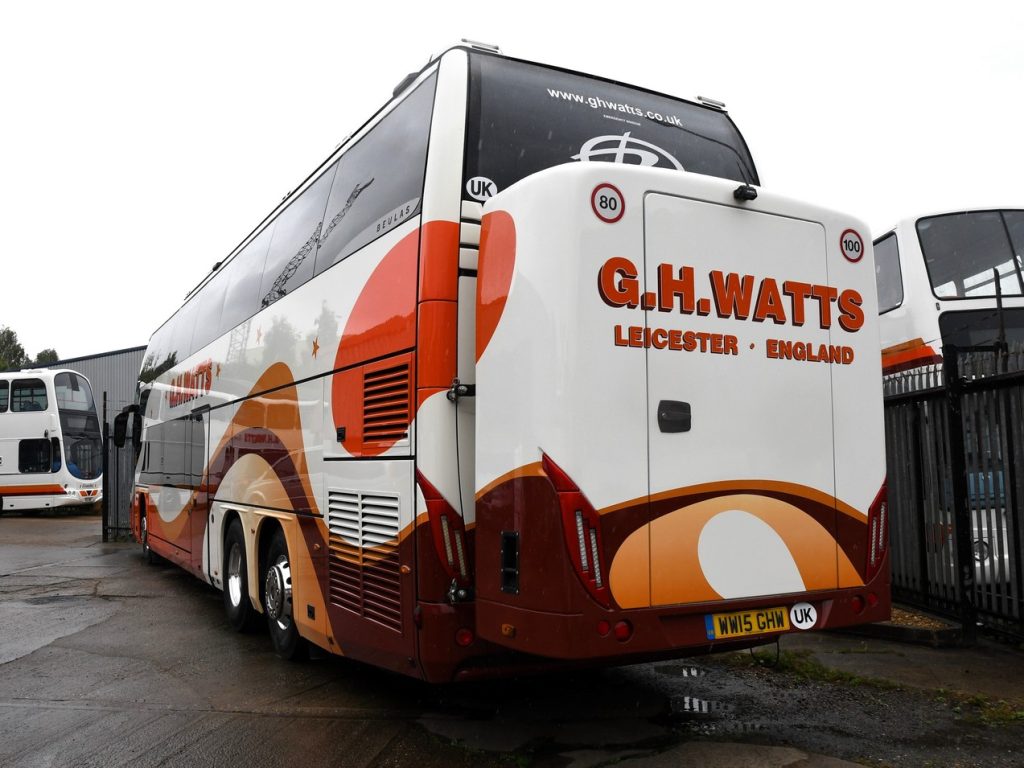
Our larger capacity coaches (60+ seats) are in demand, both because teachers like everyone together on one vehicle, and because there are fewer operators. The rates dipped a few years ago, but they’re back up now.
“Current border control delays at Dover means we have to plan in a level of contingency (hotels, feeder drivers etc) to ensure hours compliance. But that costs. The good news, if I can call it that, is that party leaders and tour companies now better understand the challenges we’re facing at the port and why hire costs have risen as a result. Positive relationships with clients have enabled us to avoid peak crossings by moving our travel days. This has made a huge difference.”
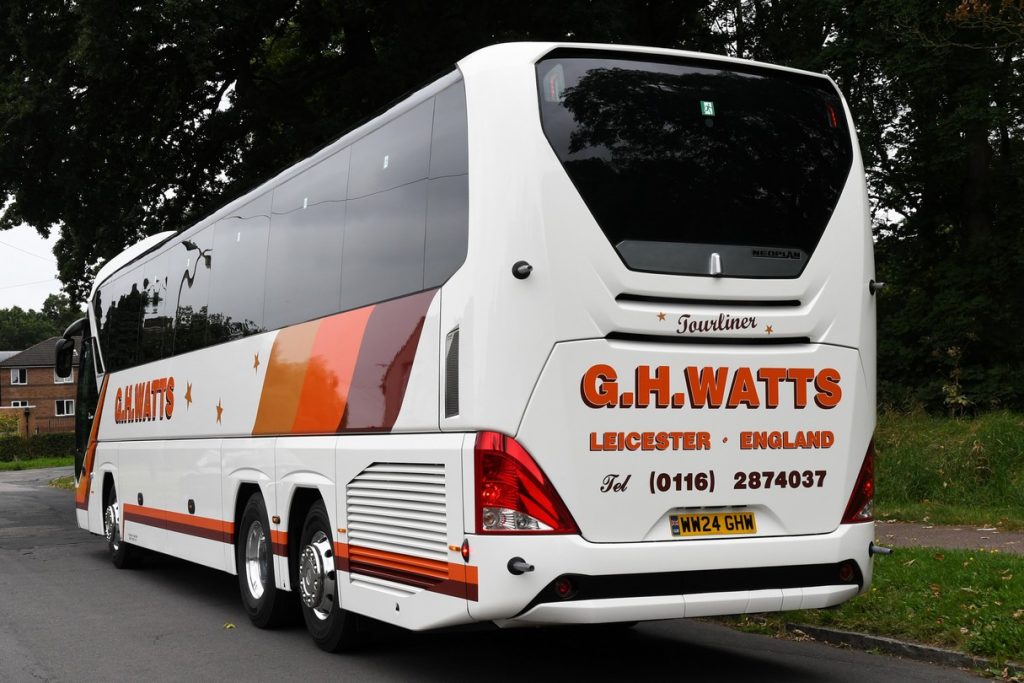
Richard’s choices
Richard has specific views on vehicle specification.
“Our latest coach is the 24-plate, 13.4m tri-axle Neoplan Tourliner,” he says. “It has 55 Kiel ‘Business Class’ seats but fitted with lap belts, not three-point belts. We have three-point belts on our 23-plate Tourliner but my own experience as a driver, and comments from our drivers, indicates that passengers are more likely to wear lap belts. They say they don’t feel as restricted as they do with three-point belts. This latest Tourliner isn’t to PSVAR specification because the destination box at the top of the windscreen obscures the forward view for passengers. In terms of driver mirrors, I’ve had a look at digital mirrors and I don’t like them. For now, we’re specifying normal mirrors. As I often say, if it’s not broken then it doesn’t need fixing! I’m behind the wheel a lot and I listen to our drivers. These are my choices.”
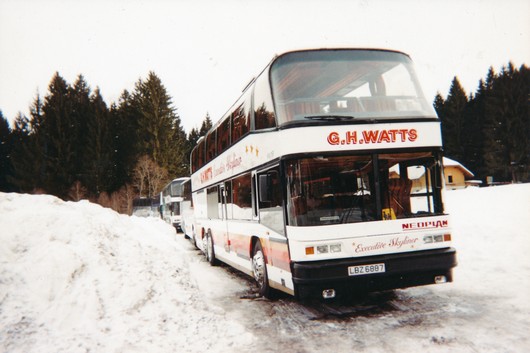
Richard explains the thinking behind what is a mixed fleet of mostly Neoplan and Yutong coaches.
“Our first MAN was a 1996 Neoplan Cityliner acquired in 2000,” he says. “That became our front-line touring coach. It was a superb vehicle prompting us to subsequently take Euroliners, Skyliners and Tourliners. We have good relations with MAN Bus and Coach UK, bringing in the first MAN RR4 chassis to the UK with Beulas Jewel bodywork – and what a machine that is! In 2012 we bought our first new Tourliner. It was a deal we couldn’t refuse. Our passengers tell us they like the Tourliner because it’s light and airy. We have a 57-seat Tourliner on order for 2025 as our Yutong GT12 can currently only accommodate 53.
“We have two Yutongs, a TC9 and the aforementioned GT12. Interestingly, our first GT12 was due in 2020. I paid for it in the March just a few days before COVID-19 hit. Pelican Bus and Coach was very good, keeping it for me. We eventually took delivery in March 2022. We replaced it with a full PSVAR model in 2023.”
The fleet also features a 2023 Van Hool EX.
“We bought it for a very good price,” says Richard. “But in light of the issue with getting spares at the moment, we’ve put it away. I’m waiting to see what happens with VDL before deciding what we do with it, but for now, I’m not risking having it develop a fault!”
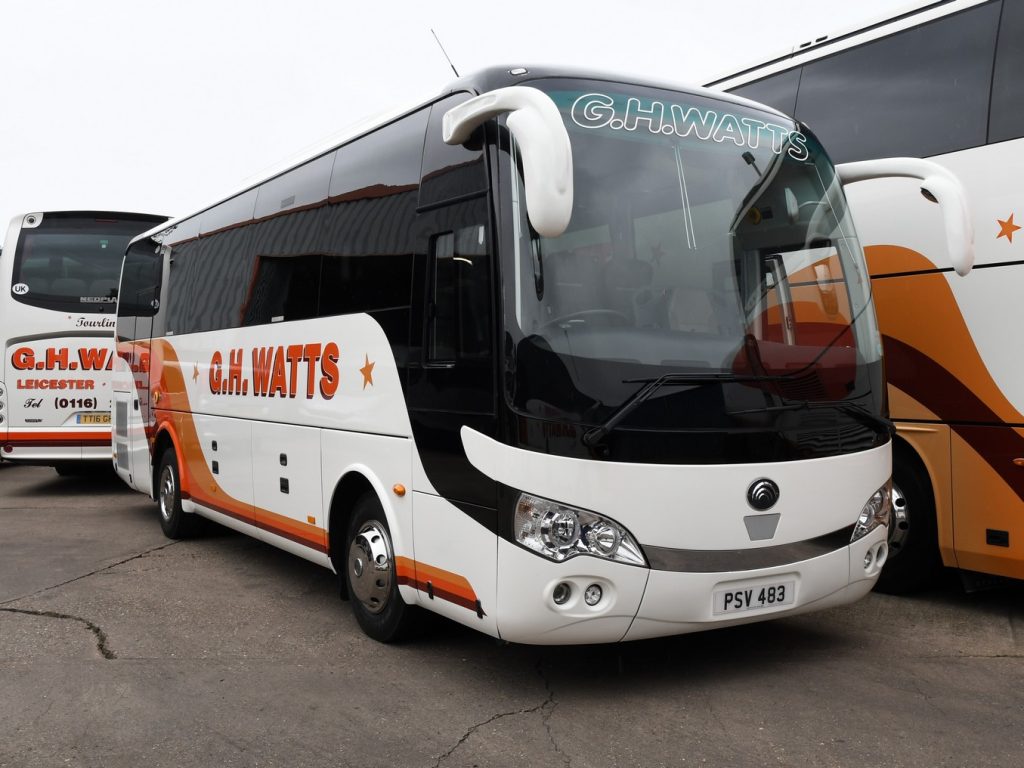
Heritage and passion
Away from the operational fleet, G.H. Watts Coaches has a five-strong heritage fleet, including the well-known and unique 1984-built Drögmöller E330 Comet coach, the only one of its type sold in the UK and featuring a rare ‘theatre’ style sloping floor. The other vehicles are a 1981 MCW Metrobus, a 1971 Seddon Pennine 4 with Plaxton Elite bodywork, a 1996 Neoplan Cityliner, and a 1996 Van Hool Alizee-bodied Scania K113. The vehicles make regular appearances at events across the country, indicating the long-held passion for the industry demonstrated by the family. A 2013 Neoplan Starliner 2, currently in the operational fleet, looks set to enter the heritage fleet in due course.
Richard notes his favoured approach to the business.
“I probably get this from my father,” he says, “but we like the personal approach rather than doing everything online. Yes, we could do things online quicker, but I do like the idea of taking your time. A personal rapport with DVSA is a positive in my book. Positive relationships with dealers and suppliers, as well as operators up and down the country, are equally important. We’re members of RHA, primarily down to the relationship we have with Andy Warrender, Operations Manager, Coach Sector. It’s refreshing to see how proactive the RHA is in seeking support for the industry from government and other authorities.
Looking ahead, I hope the fourth generation of the family will take an interest in due course. They’re already keen to help out in the yard. For me, for now, I don’t see myself doing anything else!”
